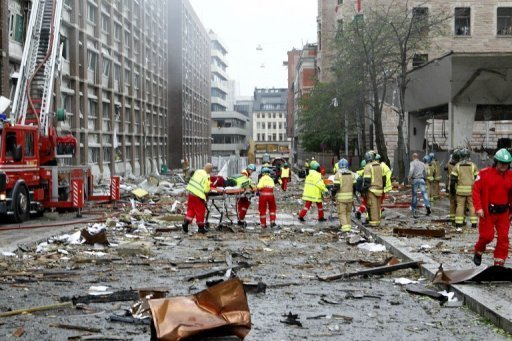Usual suspects blamed for terrorist attacks...again
When news broke last Friday afternoon of the deadly bombing in the Norwegian capital Oslo and subsequent mass shooting on nearby Utoeya island, the media jumped to the wrong conclusions. But it certainly wasn't the first such time that fingers have been pointed at what I would call the usual suspects.
Much has been written since the heartbreaking attacks of last Friday about how we journalists got it wrong - either ourselves, or by wheeling in various pundits who were just making a stab in the dark. Either way, we erroneously assumed that al Qaeda, in some shape or form, were behind Friday’s attacks. Of course, nothing could have been further from the truth. The self-confessed gunman, Anders Behring Breivik, appears to be a “lone wolf” terrorist, motivated by a hatred of Muslims, and of the ruling Norwegian Labour Party for its willingness to integrate them.
(Of course, there is some debate about whether Breivik is actually a terrorist at all. The alternative school of thought is that he is simply a madman who cannot (and indeed should not) be credited with the "terrorist" label. Now, he may well be insane, but considering that he wrote a detailed 1,500-page manifesto, I personally don't think he can just be dismissed as a nutter).

Paramedics and firefighters tend to victims of Friday’s bomb
blast in Oslo. (Photo: AFP)
Some of the criticism of the amateurish news coverage is actually quite amusing. You have to smile at this editorial by the Guardian’s Charlie Brooker, or laugh at this sketch by US satirical talk show host Stephen Colbert.
What has struck me, however, is how little people have made the parallel with the aftermath of the Madrid train bombings back in 2004. Remember how the then-Prime Minister José María Aznar almost immediately blamed the attacks on the Basque separatists ETA? He (also) got it totally wrong, and paid for it three days later by losing the general election to José Luis Rodríguez Zapatero, who has been in power ever since.
But Aznar wasn’t the only one. According to the BBC, the majority of Spanish papers also erroneously assumed that ETA was responsible for the bombings.
For me, what the Madrid bombings and the Norway attacks have in common is this: each of them created a precedent. The Madrid bombings were the first terrorist attack committed by al Qaeda-inspired terrorists in Europe. Likewise, the Norway attacks are the first mass atrocity committed by a “lone wolf” terrorist on the continent. So in a way, it’s not so surprising that the journalists and politicians got it wrong.
However, let’s not forget that attacks of the same nature, albeit not the same scale, had previously taken place on the other side of the Atlantic (9/11 and the Oklahoma City bombing respectively). Moreover, in each of the European cases there was a fairly big clue that should have cast doubt on the implication of the usual suspects.
In Madrid, it was the scale of the attacks. The train bombings killed infinitely more people - 191 lost their lives - than a typical ETA attack. At the time, ETA’s single deadliest attack had killed 21 people in a Barcelona car bomb in June 1987. (Plus, as I noticed at the time, the Madrid bombings came exactly two and a half years to the day after 9/11 - surely not a coincidence).
In Norway, it was the choice of targets. It should have been obvious from the fact that the building housing the prime minister’s office was targeted that this was certainly not a classic al Qaeda-style attack. The latter tend to target trains, metros, etc, where they can cause the maximum number of casualties among the civilian population. The choice of such a political target - as well as that of the Labour Party’s summer camp - would tend to suggest a disgruntled native, similar in profile to Timothy McVeigh.
What is different here, however, is that the Norwegian government did not jump to conclusions about who was behind the attacks. Neither did the police, who initially declined to comment on the possible cause of the explosion in Oslo when the news broke. (And that part I did get to put in the ticker).




1 Comments
Post new comment